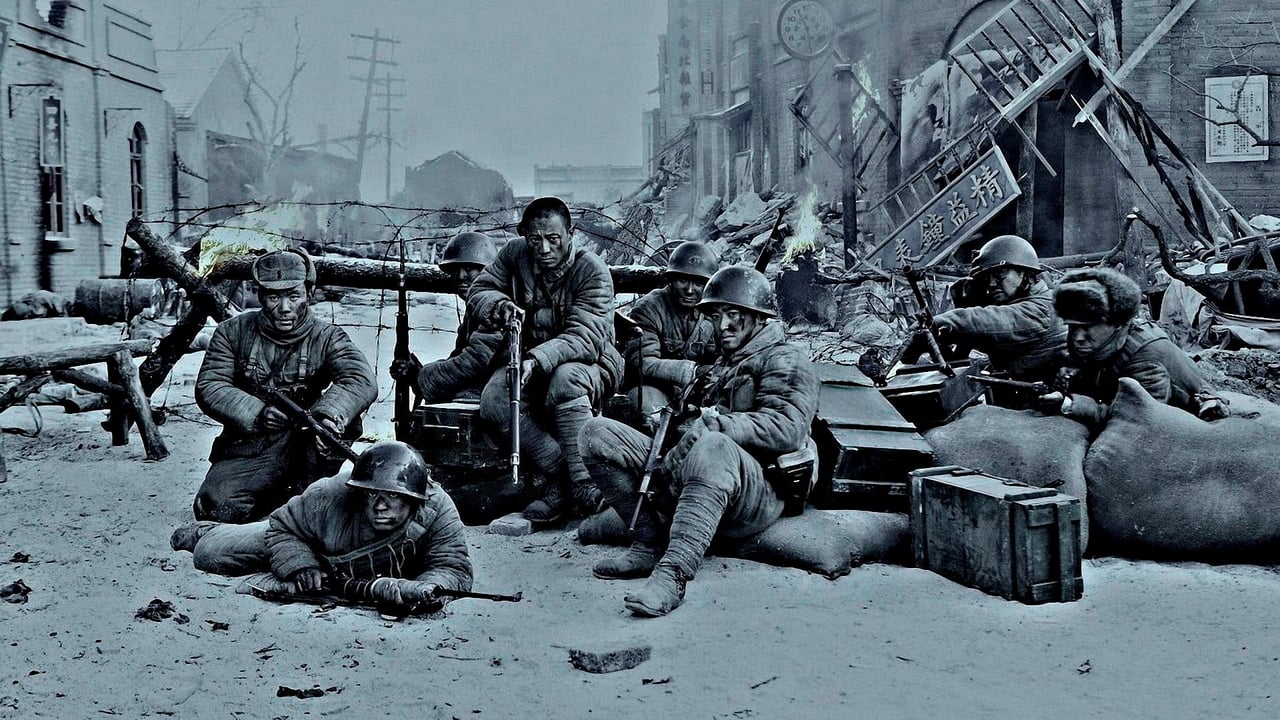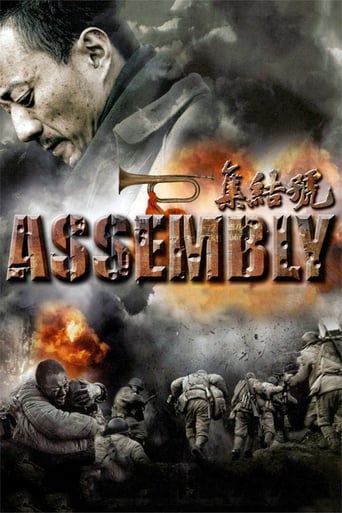

The concept of war has been familiar to the Chinese experience for millennia. While other people from different parts of the globe are no strangers to the phenomenon themselves, the Chinese do hold a special distinction. The ancient Chinese military strategist, Sun Tzu, wrote The Art of War in the 5th century about 1500 years before the invention of gunpowder. Simply put, the Chinese have been writing and depicting war far longer than most of the world. Given this fact, it's more than a little shocking that the modern Chinese film industry seems more interested in martial arts style films than genuine war films. Fortunately, the 2007 film Assembly (集结号) offers a refreshing change of pace from the usual fare. For viewers looking for blood and guts, Assembly delivers within the first fifteen minutes. Perhaps Assembly is sometimes gratuitous with the amount of violence and carnage depicted on screen. But the real history is just as bloody. Perhaps the film is doing the real story justice. Assembly is based on the incredibly true story of Captain Gu Zidi, a People's Liberation Army veteran of the Chinese Civil War. In Assembly, Zhang Hanyu takes on the role of Zidi and depicts the soldier's story starting from his time in the People's Liberation Army during the Chinese Civil War to his service in the Korean War and retirement from military life. In many ways, Zidi is an embodiment of the People's Liberation Army. He was born poor, remains mostly illiterate throughout the film, and is left to face immeasurable odds by politicians and generals who couldn't care less about him. Zidi is not a caricature of a soldier. He is a soldier and consequently commits seriously heinous actions while engaging in war. In the opening scene of the film, Zidi guarantees himself a spot in hell by executing a number of unarmed nationalist soldiers in rage. During a dark time for the People's Liberation Army of China, Zidi meets with a Colonel who orders him and his unit to defend an abandoned mine until they hear the order to retreat which is the sound of a bugle. While giving these orders, the general appears so calm that even he seems to have forgotten the true hopelessness of the situation. The bugle call never comes and Zidi's entire unit is wiped out in the ensuing battle. Zidi survives the encounter, but since the bodies of his fallen brothers in arms are never recovered, all soldiers in Zidi's 9th Company are treated as nameless martyrs. Their sacrifice is mostly ignored. Assembly is the story of how Gu Zidi returns in his old age to the mine where his comrades in 9th Company valiantly gave their lives in order to find their bodies to gain proof so the government would recognize their sacrifice. Once you get past the gratuitous violence depicted in the war scenes, you begin to realize that Assembly is more than just a war film. It is a story of redemption. Not just for Gu Zidi and his lost comrades, but also for the government of China. Thanks to Zidi's efforts and through this movie's message, China can recognize the sacrifice of thousands of nameless martyrs who secured China's stability at the cost of their lives. It may be impossible to remember all of their names. But it is beyond shameful to try and forget. War is a manifestation of human tragedy. It is the culmination of mankind's worst attributes. What makes Assembly such a great film is that despite the gratuitous blood and violence, both of which there is no shortage of during times of war, the movie presents a clear anti-war message and ends on a poignant note.A running joke throughout the film is based on the fact that Captain Gu Zidi lacks a proper name. "Gu Zidi" as a name literally translates into the phrase millet field. It's almost absurdly generic. Yet, by the end of the movie, Zidi's name becomes legend and his efforts to preserve the legacy of his comrades in arms are both commended and rewarded. His name is remembered. Therein lays the real tragedy of war. As Gu Zidi discovered in his old age, names and sacrifices are more easily forgotten than they are remembered. In his old age, Zidi sees the endless piles of graves that have piled up as a result of the Chinese Civil War. Upon noticing that the majority of the graves in the scene lacked any references to names, Zidi ponders, "Their parent's gave them names. How did they all become nameless children? ". The ending title of Assembly informs the audience that the real Gu Zidi died at the age of 71 in 1987. He didn't die a nameless martyr. His name was given to him by a shoemaker who had found him abandoned by his parents when he was three months old. He was named Gu Zidi because the location where he was found happened to be a millet field.
... View MoreIn 1948, during the Chinese Civil War, the Captain Gu Zidi (Hanyu Zhang) from the Liberation Army falls in disgrace with his superiors after an incident with prisoners of war. He is assigned with his forty-seven soldiers from the Ninth Company to defend a coal mine until they hear the retreat assembly of the bugle. Gu Zidi never hears the call, his men die and he gathers their bodies inside the mine. Gu Zidi awakes in a hospital and neither his identity and nor his officer ranking are recognized; the forty-seven soldiers that heroically died are only considered missing and their action is completely unknown by the high-command. Gu Zidi fights in the Korea War and spends the rest of his life feeling guilty for the death of his men and trying to prove and achieve recognition for the honorable deed of his forty-seven soldiers."Ji Jie Hao" is an impressive movie about the Chinese Civil War of 1948. The director Xiaogang Feng succeeds in promoting the true story of the journey of a man that spends his life trying to prove the bravery of his men that are in complete anonymity through a touching story. The extremely realistic battle scenes are comparable to "Taegukgi Hwinalrimyeo" and "Saving Private Ryan", with stunning camera work, performances and choreography. The cinematography is magnificent, and Hanyu Zhang has an awesome performance in the role of the tireless Captain Gu Zidi. My vote is nine.Title (Brazil): "Assembléia" ("Assembly")
... View MoreIn 1948 during the Chinese Civil War a broken company of men is ordered to hold an old mine until the bugler plays assembly.After the war the captain of the men, the only survivor and the only one who said he did not hear the bugle call, tries to find their bodies and prove his men died as heroes.Profoundly moving story of the brotherhood created in war and the need to right an old wrong. Though not quite perfect, this is one of the best war films I've seen, period. Its power comes not from the battles, rather from the humanity of those that fight. This is a film about people and characters first and foremost and its what lifts this toward greatness. I have never seen a film where everyone, on both sides of the battle, are portrayed as human beings. There are no monsters, no stick figures, just people. Even the people in the mass of uniforms are people even if we only see them for an instant. This is a film about the people, and the individuals who fight in times of war. None of the main characters are clichés. Its not like Saving Private Ryan where everyone is a WW2 cliché, here we have people and even if we don't know everything about them we do know that they are individuals. This is a film about the human cost of war.Ultimately the film works because of Zhang Hanyu as Captain Gu Zidi. Here is a man who is racked with guilt for "killing" all of his men. He wants nothing better than to honor them, and when after being found in the carnage of that final battle he comes to realize that no one believes him, he is forced to not only fight on but also do everything he can to see that the memory of the brave brothers is kept alive. Zhang Hanyu breaks your heart as he tries to both join his men and prove to the world that what they did mattered. It is a portrait of quiet strength and occasional rage that makes you feel for him and for the men who fought with him. Its one of the best performances of the year.I know for some the first hour of relentless battle (its nasty) will make the more sedate second half something they will have trouble sitting through. I know some will wonder where the guns have gone, but at the same time this is not a story of battle but of people. The horrors of the first hour (filmed in the now standard shaky cam style) make the poignancy of Captain Zidi's quest all the more touching, since he wants to make his mens sacrifice and trip into hell worth something. You really have to be patient and go with the film and let the film reward you in its own way. I suspect that knowing the film shifts gears for the second half helps since you don't have expectations of a two hour battle. I know that my initial attempt at watching this film blind lead me to believe this was going to be wall to wall action, however a friend who borrowed my copy before I could finish it warned me of the tone change and I think it helped me a great deal when I finally watched it from start to finish.You really should see this film since it ultimately speaks to all people who send their sons and daughters off to war and why we need to remember them.9plus out of 10 And yes its a true story.
... View Moreindeed,i agree this is a very powerful movie: chapeau to mr feng Xiaogang for this tour de force ! recent years war movies the like of "flags of our fathers", "saving private ryan","iwo jima" are certainly (and always will be) violent but with lesser gratuitous effects and they dealt very justly with the myriads of war consequences, first on the soldiers and the rest of us. i salute the initiative of mr feng. here, i am not comparing his 'the assembly' to the previous film titles, for no war is alike and comparable. but his courage in depicting a period of profound political disturbance in his own country make us all stop and ponder, and this is on a personal note since i am vietnamese and having lived through much of my own country's war, what are the tragedies of fratricide between brothers of same origins, beliefs and values. mr feng showed us the strong sides and the various weak sides of soldier in this part of the hemisphere. by that process, he erased those past clichés of Asian cultures in the practice of that belligerent art. is or are there any morality stemming out of this movie ? mr feng will be more apt to answer than myself. finally, i wish someone in my own country could have courage and integrity ( and resources !) to make this kind of movie for future generations to learn from our past. mr feng has carved himself an indelebile mark in Chinese filmaking. bravos...
... View More